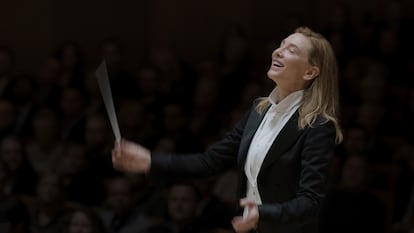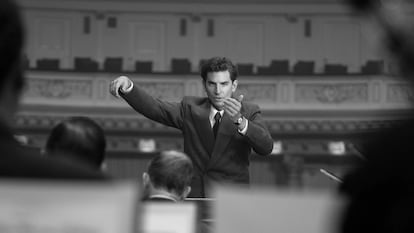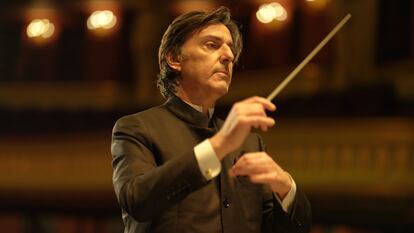The year of conductors on the big screen: From fascinating figures to exaggerated caricatures
The premiere of ‘Tár,’ the French-language ‘Maestro(s),’ the biopic about Leonard Bernstein and the soon-to-be-released Romanian film about Sergiu Celibidache have confirmed cinema’s interest in the podium and the baton


Online, you can read far more classical music jokes about conductors than about violists. At least, this is according to British music conductor Mark Wigglesworth, who counts almost half-a-million puns in his book The Silent Musician: Why Conducting Matters. While championing the podium and the baton in the classical music scene, the book is also a critical reflection on the most recognizable figure in the orchestra, associated with both power and mystery.
Wigglesworth jokes about the famous stereotype of the conductor as a spoiled megalomaniac… someone who doesn’t produce any sound, but who “proceeds to perform exaggerated gestures in front of the orchestra, conjuring a cauldron of magical sounds with a kind of wand, and who then accepts the subsequent applause of the audience while — with self-proclaimed modesty — he makes a recognition of the people who have actually played the music.”
The power and glamour associated with the baton have, once again, awakened the interest of the film world. Tár, by Todd Field, reached theaters in January, with Cate Blanchett converted into an egomaniacal and fictitious orchestra conductor. In May, it was followed by the French film Maestro(s), by Bruno Chiche. And, just recently, the biopic dedicated to Leonard Bernstein — with Bradley Cooper as the star and director — finally hit Netflix.
Cinema’s obsession with the conductor is set to continue into 2024, with the Romanian film The Yellow Tie, where we will see John Malkovich turned into the great composer Sergiu Celibidache.

This phenomenon isn’t new. There have been films starring orchestra conductors practically since the dawn of the seventh art. We can go back as far as the silent film Hearts and Flowers (1919), or to Break of Hearts (1935) and Unfaithfully Yours (1948), where Charles Boyer and Rex Harrison respectively gave life to two leading conductors. Romantic dramas then followed, with Interlude (1957) and Once More, with Feeling! (1960), where we see, respectively, Rossano Brazzi rehearsing the First Symphony by Brahms and Yul Brynner rehearsing the symphonic poem The Preludes by Franz Liszt. And with Counterpoint (1968), the figure of the orchestral director was incorporated into the war drama, starring Charlton Heston.
Many examples followed, although few are as popular as Meeting Venus (1991), the film by Hungarian director István Szabó, in which French-Danish actor Niels Arestrup directs a Tannhäuser production, with Glenn Close as a Wagnerian diva. However, there are few biopics of real-life orchestra conductors. Perhaps the two most famous are Young Toscanini (1988) and Taking Sides (2001). In the first, Franco Zeffirelli emulates the Brazilian debut of the Italian director Arturo Toscanini, with Elizabeth Taylor as the singer (and soprano Aprile Millo as her voice). In the second, Szabó explores the denazification of hearing of famed German conductor Wilhelm Furtwängler, with Swedish actor Stellan Skarsgård playing the part and conducting Beethoven’s Fifth Symphony (although you can hear Daniel Barenboim and the Staatskapelle Berlin orchestra emulating Furtwängler’s expressive freedom).
Actors who conduct orchestras
In both Tár and Maestro, real orchestras have been conducted by the actors themselves… a novelty mentioned in the booklets of both soundtracks, published by Deutsche Grammophon. To do this, both Cate Blanchett and Bradley Cooper were advised by professional conductors. The Australian actress prepared these sequences with her compatriot Natalie Murray Beale, while the American actor had the help of Yannick Nézet-Seguin.
Both performances have raised the bar for the portrayal of conductors. But Blanchett and Cooper still forget the fundamental thing: the Australian exaggerates every movement from the podium while rehearsing Mahler’s Fifth Symphony, but never connects with the musicians from the Dresden Philharmonic. The same could be said of Cooper imitating every gesture that Leonard Bernstein unleashed during the famous 1973 filming of Mahler’s Second Symphony in Ely Cathedral (U.K.). Wigglesworth reveals the key in his book: the physical relationship between the orchestra and the conductor. He concludes his explanation about music and corporeality using a famous quote from Nietzsche: “We listen to music with our muscles.” And the conductor creates it with his movements.
Cooper goes further than Blanchett in tackling a difficult six-minute-long musical sequence in a concert performance. But he doesn’t activate what we hear, nor does the result have anything to do with the original, even though the London Symphony is one of the most gifted and flexible orchestras on the planet. The American actor composes a poor caricature of Bernstein’s direction, with gestures and movements more typical of a humorous sketch. We don’t see any of the overflowing joy that Lenny demonstrated while making music.
This exaggerated imitation and characterization prevents Cooper from building a remotely credible character (although Carrey Mulligan does a great job portraying Felicia Montealegre, Bernstein’s wife). In Maestro, the imbalances between rigor and fantasy weigh down any careful biographical consideration of Bernstein related to music. We see this from the opening sequence, with his famous debut at Carnegie Hall in November 1943. None of the best-known stories from his life are included. For instance, once, when Lenny hadn’t been able to prepare the works he needed to direct, he decided to visit the conductor he was going to replace — the legendary Bruno Walter — who, sick with the flu, received him at his hotel covered in blankets. Still, he had enough strength to walk Bernstein through the fundamentals of the concert program. Then, there’s the other famous story of the pharmacist at Carnegie Hall, who passed the meek-looking conductor some pills: one to calm him down and another to give him some energy. This episode isn’t used, either.

As for Maestro(s) — Chiche’s French film — the competition between a father and a son moves from the study of the Talmud to orchestral direction. The cast is strong, but the result is nothing more than mere entertainment. The conducting is, once again, simple decoration that culminates in a peculiar sequence with the two batons that are portrayed on the film’s poster.
Finally, next year, The Yellow Tie will be released, a biopic about Romanian conductor Sergiu Celibidache. It was filmed by his son, Serge Ioan Celebidachi, between June and August 2023. A film starring John Malkovich, it portrays the Romanian conductor in his old age. The movie includes the recreation of a 1989 concert with the Munich Philharmonic, at the Palatului Hall in Bucharest, where Malkovich conducted several fragments of a symphony by the Austrian composer Anton Bruckner. We’ll have to wait and see if this film avoids transforming the fascination with another great orchestral figure into yet another caricature.
Sign up for our weekly newsletter to get more English-language news coverage from EL PAÍS USA Edition
Tu suscripción se está usando en otro dispositivo
¿Quieres añadir otro usuario a tu suscripción?
Si continúas leyendo en este dispositivo, no se podrá leer en el otro.
FlechaTu suscripción se está usando en otro dispositivo y solo puedes acceder a EL PAÍS desde un dispositivo a la vez.
Si quieres compartir tu cuenta, cambia tu suscripción a la modalidad Premium, así podrás añadir otro usuario. Cada uno accederá con su propia cuenta de email, lo que os permitirá personalizar vuestra experiencia en EL PAÍS.
¿Tienes una suscripción de empresa? Accede aquí para contratar más cuentas.
En el caso de no saber quién está usando tu cuenta, te recomendamos cambiar tu contraseña aquí.
Si decides continuar compartiendo tu cuenta, este mensaje se mostrará en tu dispositivo y en el de la otra persona que está usando tu cuenta de forma indefinida, afectando a tu experiencia de lectura. Puedes consultar aquí los términos y condiciones de la suscripción digital.








































